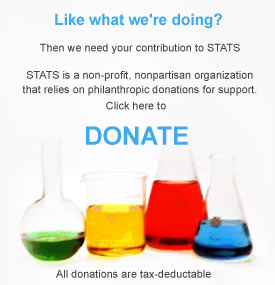|
San Francisco Chronicle “toying” with parents’ fears
Media scaremongering over vinyl toys shows how little journalists know about science (Nov 26)
Dyspercentagia at the New York Times
If a menstrual disorder affects 90 percent of adolescent girls, is it really a disorder? (Nov 24)
Is there an ideal time to get married?
The time to start living happily ever after is whenever you find the right person. Why comparisons between people who marry early and not so early tell us very little about when to say “I do."
(Nov 10)
Media being spun in attack on FDA's credibility over BPA?
The FDA has taken the same position as the European Union on the chemical BPA: It's not a risk to infants or adults. So why is this consensus with Europe being ignored?(Oct 29)
Measuring diversity in philanthropy
STATS analysis of the statistical flaws in the the attempt to measure minority participation and giving in philanthropy cited by Wall Street Journal. (Nov 4)
Do women have a higher pain threshold than men?
In MSN Health and Fitness, STATS' Maia Szalavitz reports on some surprising research calling a longstanding belief into question(Oct 16)

 STATS/Harris Interactive Survey: Climate Scientists Agree on Warming, Disagree on Dangers, and Don’t Trust the Media’s Coverage of Climate Change. STATS/Harris Interactive Survey: Climate Scientists Agree on Warming, Disagree on Dangers, and Don’t Trust the Media’s Coverage of Climate Change.
Eighty-four percent say they personally believe human-induced warming is occurring, and 74% agree that “currently available scientific evidence” substantiates its occurrence... more
Can We Trust Climate Models?
To perform the experiments they’d like, climate scientists would need a few million Earths, billions of years, and omnipotence. Then they could pump extra greenhouse gases into the atmosphere of one Earth, prod volcanoes into mad eruptions on another, summon up sunspots to stream extra radiation to the third. They could stop the oceans from circulating, cover the sky with clouds, melt the polar ice. Then they’d sit back and watch what happened, deducing from the consequences how climate works... instead, they have to try and build models accounting for all these factors. How reliable can they be?
by Geoffrey C. Kabat
Kabat, a senior epidemiologist at the Albert Einstein College of Medicine in New York City, "approaches health scares as 'social facts' and shows that a variety of factors can contribute to the inflating of a hazard. These include skewed reporting by the media, but also, surprisingly, the actions of researchers who may emphasize certain findings while ignoring others, regulatory and health agencies eager to show their responsiveness to the health concerns of the public, politicians, and advocates with a stake in a particular outcome."
Robert J. Davis
 "Pronouncements we rarely think to question turn out to be half-truths that are being pushed by various individuals or groups to advance their own agendas. The Healthy Skeptic explores who these health promoters are—from journalists and celebrities to industry-funded groups and consumer activists—what their motives are, and how they are spinning us in ways we often don't realize." "Pronouncements we rarely think to question turn out to be half-truths that are being pushed by various individuals or groups to advance their own agendas. The Healthy Skeptic explores who these health promoters are—from journalists and celebrities to industry-funded groups and consumer activists—what their motives are, and how they are spinning us in ways we often don't realize."

|
|
Online Lecture
"Spinning Heads and Spinning News:
Statistics in the Media."
 Watch STATS Director of Research, Rebecca Goldin Ph.D's lecture on how the media miss the mark in the use and presentation of statistics in stories about the economy, health, science, and education. The talk was given as part of the Mathematical Association of America's Distinguished Lecture Series in Washington DC on October 28. (Nov 6) Watch STATS Director of Research, Rebecca Goldin Ph.D's lecture on how the media miss the mark in the use and presentation of statistics in stories about the economy, health, science, and education. The talk was given as part of the Mathematical Association of America's Distinguished Lecture Series in Washington DC on October 28. (Nov 6)

Award-winning journalist, technology writer, and journalism educator Steve Ross boils down the essential principles journalists should follow when reporting on science, polling and statistics.
Every day, it seems there's a new study in the media telling you what to be afraid of. Don't panic! Read our guide before you rush to change your life.
"Our brains are terrible at assessing modern risks," says STATS' Maia Szalavitz in Psychology Today. "Here's how to think straight about dangers in your midst."
 And just what are your odds of getting injured or dying from everyday activities such as grilling, lawn mowing, and watching TV? Can Pyrex dishes spontaneously explode? We analyze the statistics and the science. And just what are your odds of getting injured or dying from everyday activities such as grilling, lawn mowing, and watching TV? Can Pyrex dishes spontaneously explode? We analyze the statistics and the science.
We also examine the latest health scares on mattresses, the iPhone, Avandia, Teflon, new car smell, nail polish, saran wrap, and phthalates.
When a newspaper compared cigarette smoking to using infant formula,we suspected that there's got to
be something screwy with the science, which is, in fact, the case.
We also look at the connection between diabetes and nursing, and whether using formula increases an infant's risk of developing leukemia. Will an epidural make breast feeding more difficult? Is it better for HIV mothers to breastfeed or not breastfeed – and does it depend on where they live?
What are the risks of light to moderate alcohol consumption during pregnancy - what does the reasearch really say? And just how much coffee can you drink when you are pregnant? And is there a link between coffee and miscarriage?
Should You Be Worried About Toxic Baby Bottles?
Lots of scare stories, but independent European scientific assessments and new studies argue research showing risk is flawed. This news isn't making the media coverage.
Did you know that at least 50 percent of people with these addictions have an additional mental illness? So why do many states not even require addiction counselors to have a high school diploma? STATS' Maia Szalavitz investigates all on on MSN Health and Fitness.
Underage drinking is a serious problem for our society.  From reports in the media, one gets the impression that it is getting worse ever year and that even casual teenage drinking carries with it devastating implications for our youth, including increasing the alcoholism rate of those who drink early and even death. Do the statistics support these stories? Find out the facts at STATS alcoholnews.org. From reports in the media, one gets the impression that it is getting worse ever year and that even casual teenage drinking carries with it devastating implications for our youth, including increasing the alcoholism rate of those who drink early and even death. Do the statistics support these stories? Find out the facts at STATS alcoholnews.org.
|